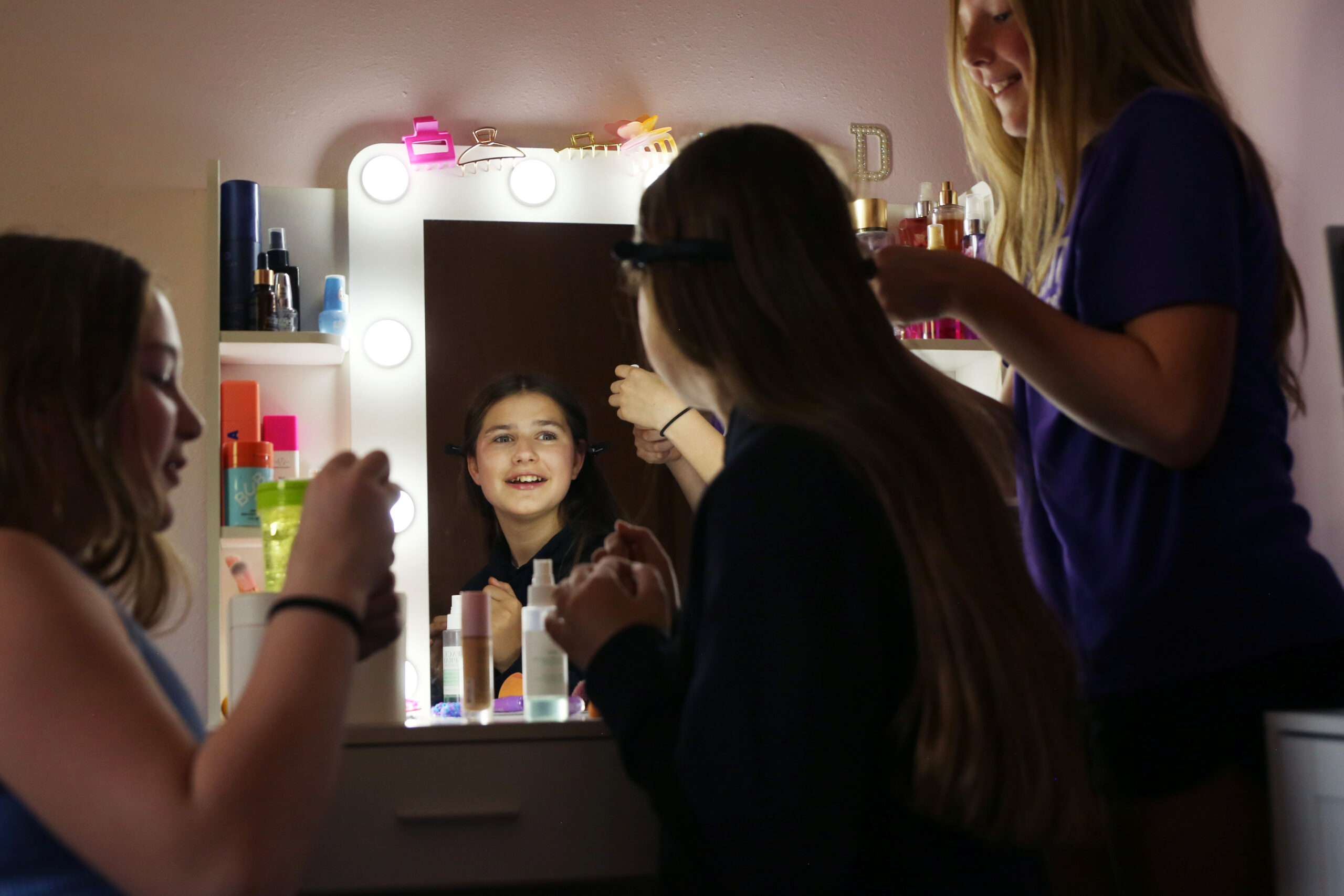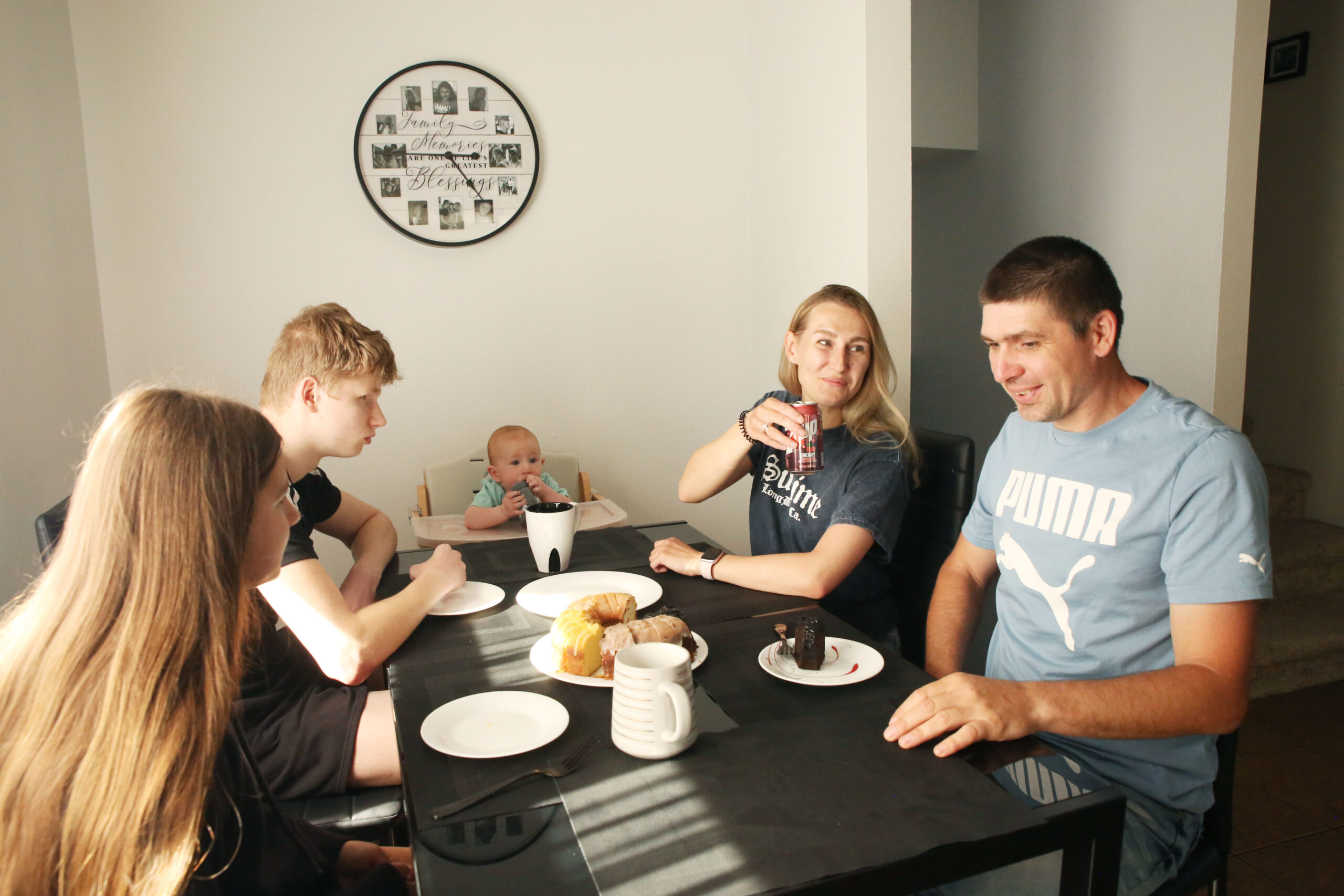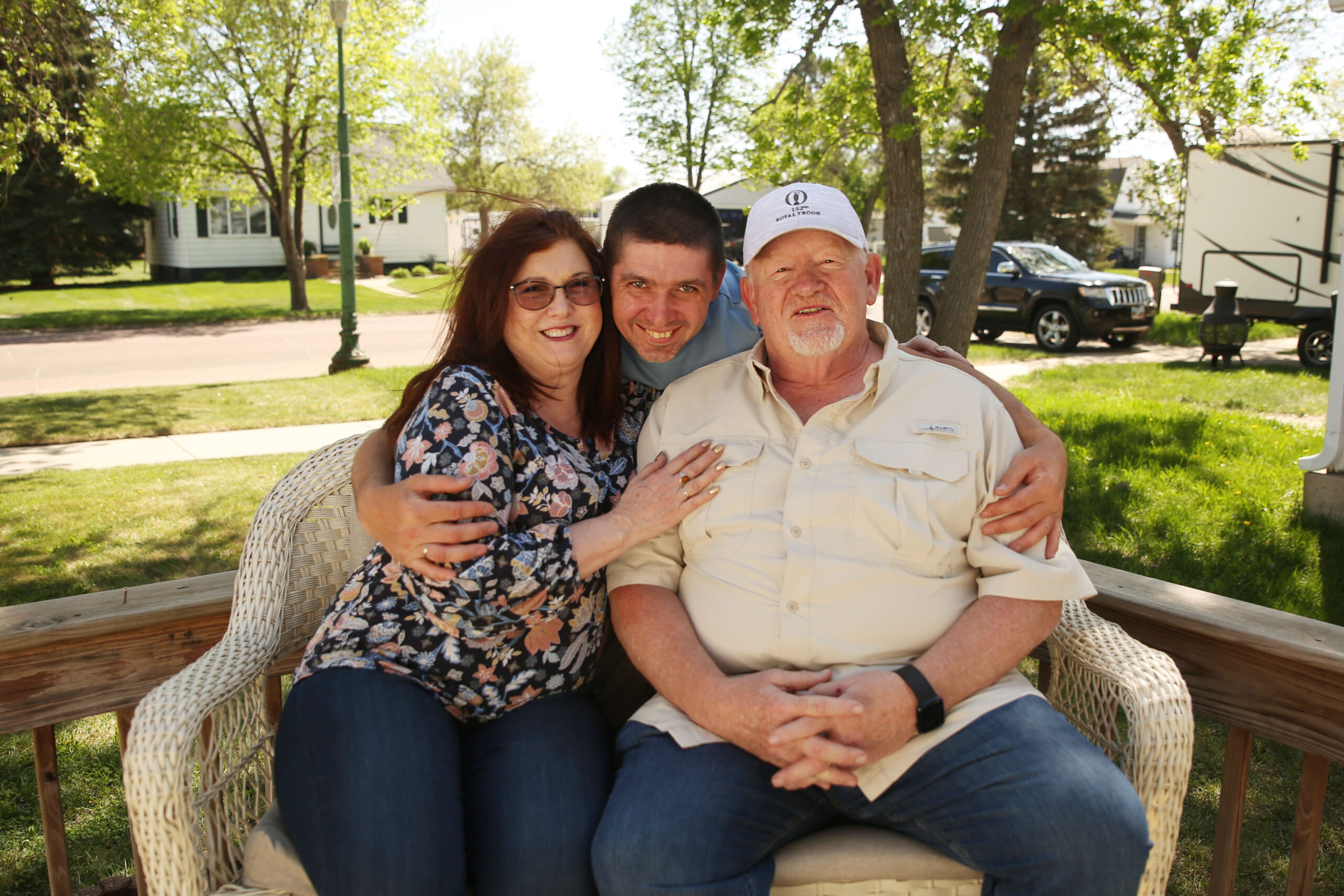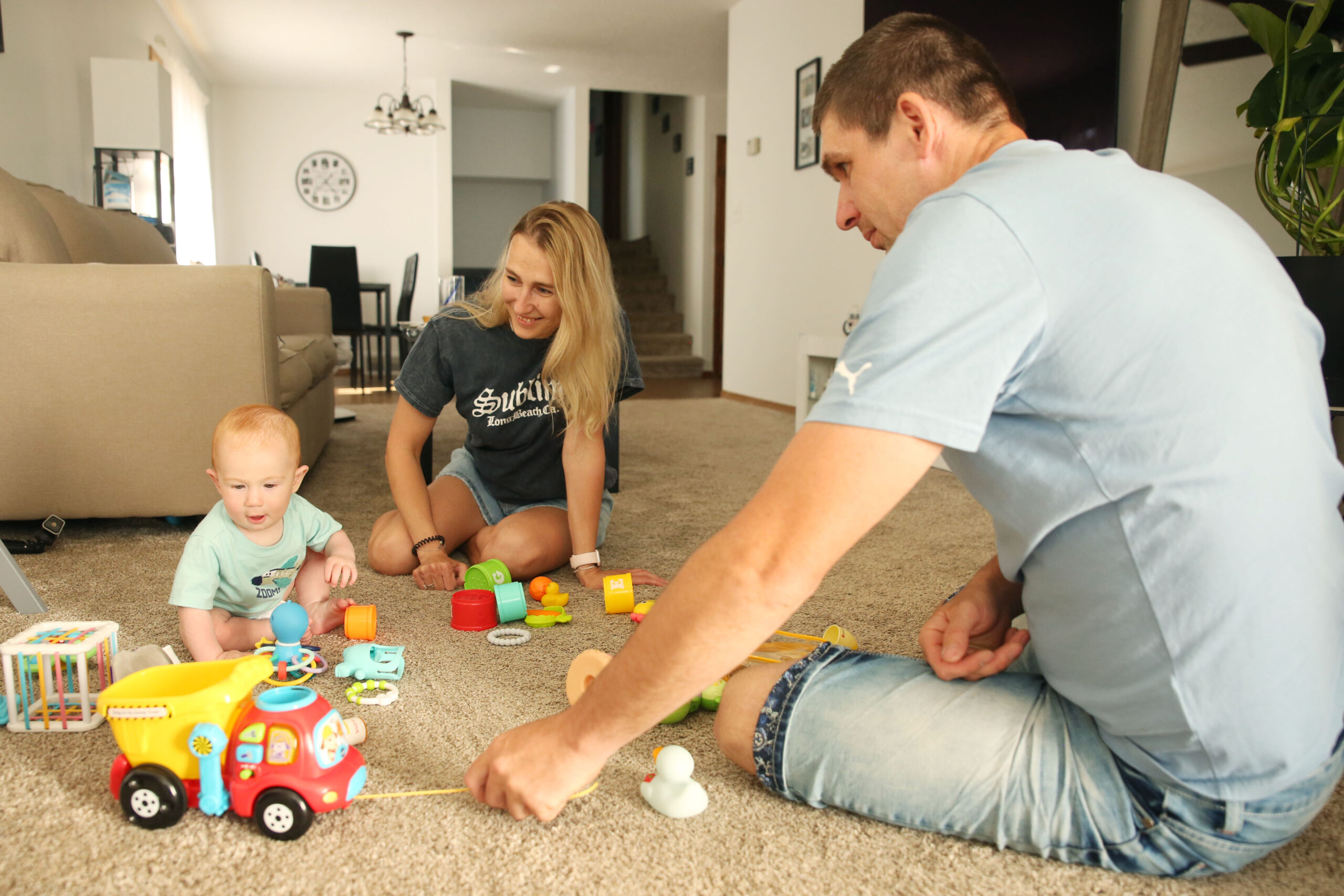Ilona Biliaze plays with her 7-month-old son Brian in their Watertown home on May 12, 2025. (Makenzie Huber/South Dakota Searchlight)
WATERTOWN — It’s a simple life that seemed impossible two years ago. Now it could be in jeopardy.
In the South Dakota home of displaced Ukrainians Ilona and Valerii Biliaze, sun shines through gauzy curtains as their 7-month-old baby naps below a window. Their 16-year-old son scrolls Instagram in his room after school, and their 12-year-old daughter lounges on her bed, sandwiched between school friends while gossiping.
Valerii is a self-employed contractor. Ilona stays home, watching their infant son when the kids are at school.
A town saved a nonprofit office to help laid-off immigrant workers find jobs. Now it’s all in peril.
Two years ago, they were refugees in France struggling to find work and make a living. They fled their home of Mariupol — one of the first cities Russia attacked in Ukraine — five weeks after the war broke out.
When the invasion began in 2022, electricity and heat were cut off as shelling became a constant background noise. Their children slept in a closet, never allowed to leave or approach the windows. They found shelter in a relative’s apartment after their own apartment building was razed by tank fire.
Valerii passed dead bodies — neighbors, friends, strangers — as he sought food and water for their family. He risked his life each time he stepped outside their door, while snipers aimed at him and others as they collected water near the seaside.
They escaped all that and found a new home in South Dakota. But by Aug. 17, the life they’ve built could be gone.

The Biliazes are among 117,000 Ukrainians who came to the United States through the Uniting for Ukraine (U4U) program after fleeing the Russian invasion.
The effort is known as a humanitarian parole program. It’s carried out under the U.S. Homeland Security secretary’s authority to allow noncitizens into the country with a sponsor on a temporary, case-by-case basis for urgent humanitarian reasons.
Lutheran Social Services of South Dakota — the state’s designated refugee resettlement agency — has welcomed 484 Ukrainians to the state since the U4U program started in 2022. The nonprofit additionally worked on parole cases involving 90 Haitians and 169 Cubans in federal fiscal year 2024. There may also be legally admitted Ukrainians, Cubans and Haitians in South Dakota who haven’t opted to work with LSS.
The Trump administration and its Homeland Security Secretary Kristi Noem — the former governor of South Dakota — have terminated the humanitarian parole status of Cubans, Haitians, Nicaraguans and Venezuelans, among other sweeping changes to immigration policy and enforcement.
The administration has not terminated the status of U4U participants, but has paused new applications to the program, including extension requests. The Department of Homeland Security erroneously sent emails to U4U participants in April saying their protected status was revoked. Although the emails were sent in error, they stoked fears that an actual revocation could follow.

Congress has not offered a pathway to legal permanent residency for Ukrainian parolees. When the Biliazes hit their two-year anniversary of arriving in Watertown in August, their parole will expire. They were denied in April for asylum — another form of legal residency for people with a well-founded fear of persecution in their home country. Their options include returning to war-torn Ukraine, seeking refuge in a new country or waiting as they appeal their asylum case.
The Biliazes do not know where they will go. If they return to Ukraine, Valerii and their oldest son might have to fight in the war they worked so hard to escape. They already sought refuge in France, but were not able to secure work and were moved every three months within the country.
We don’t have a plan. We don’t even want to think about starting over again.
– Ilona Biliaze
The couple have been taking English classes in the U.S., anticipating they would make Watertown their permanent home. Humanitarian parole, before this administration, could be extended for decades on a case-by-case basis. Humanitarian parole in the U.S. began in 1956.
The Biliazes’ daughter is nearly fluent in English. Their youngest child is an American-born citizen.
“We don’t have a plan,” Ilona told South Dakota Searchlight through a translator. “We don’t even want to think about starting over again.”
Taxes, work and school: ‘They’re contributing’
Susan and Bruce Buhler sweep into the Biliaze house with full-bodied hugs. Susan lifts the baby from his mother’s arms, doting on him and urging him to say “Babushka” or grandmother. She’s been studying Russian to more easily communicate with the family.
The two retirees live a few blocks away, and they serve as the family’s main sponsor. Their basement was the Biliazes’ home for 10 months after they arrived in the United States.
“We had space,” Bruce said. “They were people in need and we felt terrible about families being displaced.”

Ilona filled out an application online for the U4U program while they were in France and posted a profile of their family, hoping to find a required American sponsor to help pay the family’s way to the country, secure jobs and fill out paperwork. Bruce helped Valerii secure construction work within three days of living in Watertown. The couple also taught them how to drive in South Dakota.
Eight families from the Buhlers’ church pooled funds to sponsor a family after Russia’s attack on Ukraine. Bruce and Susan selected the family off a website “like a dating site,” based on their family photo and a resume, Susan recalled.
The two families spent most summer nights visiting and playing games on the Buhlers’ screened-in backyard deck. Once Ilona and Valerii found out they were expecting, they rented their own house.
Valerii and Ilona own two vehicles. They bought furniture for their new home. Valerii paid thousands in federal taxes this year. They named their son Brian — the most American name they could think of.
“An All-American name for an American boy,” Valerii said in English, smiling proudly.

Bruce chafes when he thinks about the family being forced out of the country.
“It just doesn’t make any sense,” he said. “They’re living their lives, paying taxes, contributing. They’re here legally. Anyone I bring it up to would tell you it’s crazy.”
Bruce said there are about a dozen other Ukrainian families living in Watertown on humanitarian parole. More families followed in the months after the Biliazes arrived, moving to Watertown under other sponsor families.
Two of the families left the country before the end of their parole, hoping to find refuge in European countries.
“They’re kicking people out who are good and hardworking,” Bruce said. “We need as many people in the workforce as we can get.”
Uncertainty creates anxiety within Ukrainian, Haitian communities
Ilona and Valerii applied for asylum in August last year, hoping it would offer a new avenue to citizenship or stall their impending deportation if the Ukrainian humanitarian parole program wasn’t renewed. Fleeing a war does not necessarily justify asylum. The status is based on persecution of a person’s race, religion, nationality, political opinion, or social group membership in their home country, according to the U.S. Citizenship and Immigration Services.
The Biliazes received a rejection in April, and their attorney wrote a 19-page rebuttal. They are waiting for a determination on their appeal, but they don’t have much hope.
Since they applied for asylum, though, they were approved for a new work permit authorizing Ilona and their daughter to potentially live and work in the United States through June 2030, as long as their asylum case remains pending. The family is waiting to hear if they’ve been approved work permits for Valerii and their oldest son.
![Susan Buhler admires [NAME] Biliaze's make up in Watertown on May 12, 2025. (Makenzie Huber/South Dakota Searchlight)](https://rapidcitypost.com/wp-content/uploads/2025/06/591A9951-scaled-1.jpg)
Those permits could keep them in the country past August, if the case isn’t decided before then. The average processing time for asylum is five years, said Lutheran Social Service State Refugee Coordinator Dana Boraas. The Trump administration hopes to speed the process up.
If the asylum office doesn’t make a decision on the family’s appeal before their August deportation date, or decides to reject it, it’ll be forwarded to an immigration court. There, the Biliazes will be placed in deportation proceedings, where they’ll have another chance to have asylum decided by a judge.
Bruce Blumer, founder of Haiti Alive, sponsors a Haitian family living in South Dakota. The family of four are in the country under humanitarian parole, Blumer said, but they have “gnawing anxiety” after their work permits were terminated. They have until August before they have to leave the country.
The part that really disturbs me is that these people did exactly what this administration says they should do. They went through immigration, they filed and came here legally to our country.
– Bruce Blumer
The Federal Aviation Administration has extended its ban on U.S. flights to Haiti’s capital until Sept. 8, citing security risks from armed gangs.
“You’re sending these people back into dangerous, difficult and probably life threatening situations,” Blumer said.
Fortunately, Blumer said, Canada is accepting Haitians. The family he sponsors has been able to secure Canadian visas and plans to relocate there, he said, instead of returning to Haiti.
Ending the United States humanitarian parole programs is “nothing short of vindictive,” Blumer added.
“The part that really disturbs me is that these people did exactly what this administration says they should do,” Blumer said. “They went through immigration, they filed and came here legally to our country. They had an added step of having a sponsor to willingly contribute financially and vouch for these families.”
The Buhlers have sought help from South Dakota’s congressional delegates, but they have only received “generic responses” back. They don’t know where else to turn.
The Biliazes hope something will change.
“We’re still hoping we get to stay,” Ilona said. “This is our home.”
GET THE MORNING HEADLINES.






